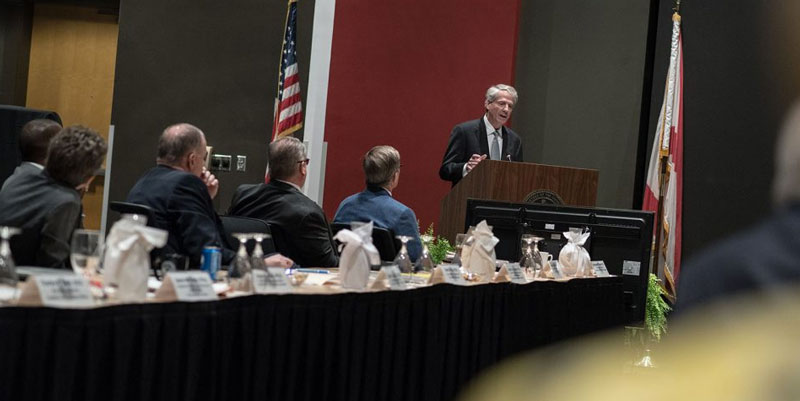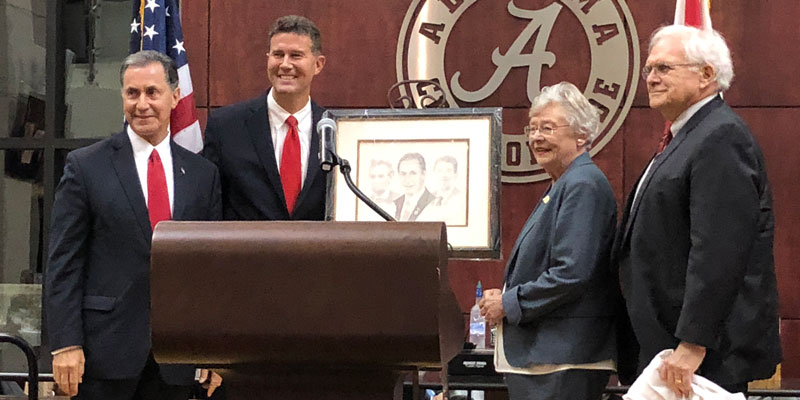Perhaps the most hotly contested item on Tuesday’s upcoming general election ballot has been Amendment Two, the pro-life constitutional amendment, with Planned Parenthood and other out-of-state liberal groups set to spend over $1.3 million on what has been called a “false and misleading advertising campaign” that is based on “lies.”
While Amendment Three, which updates the composition of the University of Alabama System’s Board of Trustees (BOT), has flown under the radar, it has also faced significant misinformation, just in the form of an in-state agenda-driven liberal.
The Alabama Media Group’s Pulitzer Prize-winning commentator, John Archibald, recently wrote a colorful writeup about all four of the constitutional amendments on the statewide ballot.
The biggest problem with Archibald’s two paragraphs on Amendment Three? He gets all of the relevant facts wrong. He is incorrect. And whether he is simply lying because he still holds an obsessive grudge against UA’s power structure from his days as a Crimson White Columnist or just woefully uninformed, the reality is his column is the only information on the amendment many Alabamians will see before voting. And Alabama Media Group knows it.
Here is what Archibald wrote:
Amendment 3, which gives the University of Alabama Board of Trustees more power to control their own wants and needs, removes the State Superintendent of Education from the board and ends the requirement that people over 70 must resign. Call it the “Welcome back Paul Bryant Jr. Amendment.”
Granted, 70 ain’t what it used to be. But this amendment lets the self-appointing UA board – already one of the most powerful forces in the state – get what they want and answer to no one. Vote no.
First, we will start with “gives the University of Alabama Board of Trustees more power to control their own wants and needs.” He is apparently referring to the fact that the amendment freezes the current regional composition of the BOT. As it stands, each congressional district in the state gets two trustees, with the majority-minority AL-7 (where the Tuscaloosa campus is) getting a third.
Alabama likely will lose a congressional seat after the 2020 census, so if Amendment Three does not pass, the BOT would lose two trustees entirely, destabilizing its leadership. Plus, tying the composition of the board to the current congressional apportionment will mean more diverse representation moving forward – whether it is race, gender, socioeconomic, geographic, professional, subject matter expertise, you name it, the current makeup is broader and deeper than it would be if the state loses a district and has to mash different regions together.
For a system that is heavily involved in the state’s economic and workforce development efforts, plus specialty endeavors like UAB’s health system and medical research and UAH’s aerospace presence, having fewer trustees, each with unique backgrounds that compliment an aspect of the System’s portfolio, would seriously jeopardize its ability to stay involved in so many crucial components of Alabama’s continued progress.
On this first point, Archibald not only misleads with his vague (and factless) swipe about “more power” and the board being selfish, but he leaves out relevant information, too. He does voters a disservice by not mentioning that Auburn has already tied their board composition to a past congressional apportionment, ensuring census swings do not cause volatility in their BOT. They did so in 1961, so Auburn will not be affected by any upcoming congressional reapportionments. For Archibald to say this is some unprecedented power grab by UA is simply false.
Next, let’s tackle “removes the State Superintendent of Education from the board.” This is true, but without proper context, can give readers the wrong impression. Most importantly, the superintendent is currently an ex-officio member, meaning he or she has no vote on BOT business anyway. And again, this is a move that Auburn and other universities in the state have already made to their boards. It is standard practice.
Then, we get to Archibald’s whopper: “[E]nds the requirement that people over 70 must resign. Call it the ‘Welcome back Paul Bryant Jr. Amendment.’”
This one is simple. Alabamians passed a constitutional referendum in 2016, Amendment 925 to the state constitution, that already ended the maximum age limit for trustees and all other elected or appointed state positions besides judgeships. Hence, all Amendment Three on this year’s ballot does is update the language in the law to conformity – it does not change the law itself because Amendment 925 already did so.
Last, just move down to, “But this amendment lets the self-appointing UA board – already one of the most powerful forces in the state – get what they want and answer to no one.”
This has nothing to do with the amendment, but it does reveal Archibald’s agenda. He hates the University of Alabama System’s Board of Trustees. In a weird way, it all goes back to his vendetta with “The Machine.” He wants the university’s power structure to be a social justice-driven beacon of social activism.
Instead, the System and its BOT focuses on its mission: “[T]o serve all people of Alabama through teaching, research, and service programs. As resources permit, the institutions extend these functions to the nation and beyond through a wide variety of educational programs and services. The institutions of the System assist students in developing the knowledge, skills, attitudes, and behaviors necessary to function as responsible and productive citizens in a democracy. They endeavor to improve the quality of life through programs for high-quality research, public service, outreach, cultural enrichment, health care, and economic advancement.”
A “yes” vote on Amendment Three furthers this mission.
Sean Ross is a staff writer for Yellowhammer News. You can follow him on Twitter @sean_yhn













